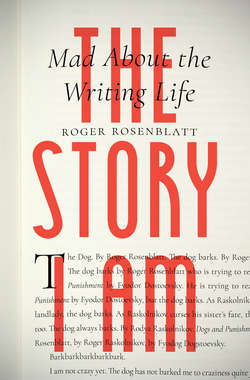Читать книгу The Story I Am - Roger Rosenblatt - Страница 10
На сайте Литреса книга снята с продажи.
ОглавлениеMay I Kill You?
And what do you do?
I’m a writer. May I kill you?
What do you write, if you don’t mind my asking?
I do mind. May I kill you?
Would I have read anything you wrote?
No. No one has. May I kill you?
That last novel of yours—what was it about?
Nothing. May I k . . .
And yet it showed promise. Or am I thinking of another writer?
You are.
I’m a novelist, too, you know. I wonder if I could send you my manuscript?
Of course. Please do send me your manuscript. But not by snail mail. Send it FedEx. So I can have it sooner. You know, I was remarking to my pet bat, Arthur, just the other night. I said, Arthur, I wish to God someone, anyone, would send me his manuscript. Or hers. I’d like to read the manuscripts in North America first, then extend my purview to the Baltic states and Indonesia, where, I understand, there are many more manuscripts.
Are you okay? You’re sounding overwrought. Kind of manic. But I guess all writers are a bit wound tight.
Yes we are. May I kill you?
I must tell you, this piece of yours is great. But it’s not for us.
Who is it for, do you think?
Can’t say. It’s just not for us.
Maybe it’s not for anyone. What do you think?
I don’t know. But I do know it’s not for us. On the other hand, we really loved it and want to publish it as soon as possible.
You do?
Absolutely. Only, the first hundred pages? They have to go.
But the book is only 104 pages long.
Is it ever! We loved it!
What’s wrong with the first hundred pages?
Nothing major. We can’t tell who the main character is. And we don’t know what the story is about. And we wouldn’t be interested if we did. Do you see what we mean?
Absolutely. I could not agree more. I worked on the novel only six years, give or take, to pass the time. I knew it was shit. But you know how bored one gets. It was just something to do.
We understand perfectly. Would you like to kill us?
Would I! But not quickly. Crush your tongue in a vise. Pluck out your eyes with sherbet scoops. Sear your ass with a soldering iron. That’s the way I’d like to do it.
I love your work.
You love my work?
It reminds me of Proust.
It does? Have you ever read Proust?
No. No one has. No one’s ever read Proust. It’s just something to say.
So you really don’t love my work.
No, but I love Proust.
Me, too. May I kill you?
Know what I love best about your work? Its neorealism, that’s what. And its neoplatonism, too. And its neologisms, they’re the tops! I also love its lapidary style. Its catachresis.
Everything actually. The entire oeuvre.
Are you from The New York Review of Books?
Who isn’t?
What did your review say about my novel? I forget.
We called it “lurid yet redeeming.”
Ah, yes.
We also called it “lacking in style and content, yet brave.” Personally, I don’t think I’ve ever read a braver novel. How it fought off those other novels. Oh, see what I’ve done. I’ve hurt your feelings. Look. The trouble with you writers is you’re too touchy. Too—how shall I put it—needy.
Why not say needy?
Needy. Yes. All you ever want is praise, praise, and more praise. And when you don’t get it, you get all steamed up and pissed off. And you seek revenge. Revenge! Against us. You want to kill us. Other people. Why you don’t even think about other people—unless, of course, we’re praising you. Any other time, we’re useless to you. Get real, will you? No one receives praise. That’s the way of the world. When the guy gives you change at the 7-Eleven, do you tell him: “Hey man! Great change!” Planet Earth, me bucko. Your work may be brilliant or it may stink, and no one will ever know who you are, and you’ll die and people will discover your unpublished stuff posthumously and say it stinks, too. Why should you care? That’s not why you write. You write to do it. Isn’t that so?
Do you mean that?
Certainly, I mean it.
You think we writers are destructively self-involved?
Duh!
Well, I must say. I never thought of it from your point of view. And what you say makes sense. I don’t write for you, any of you. I write for me. Yes! This conversation has been a real eye-opener. Thanks. Thanks very much. Just one more question.
{ essay in The Kenyon Review }
